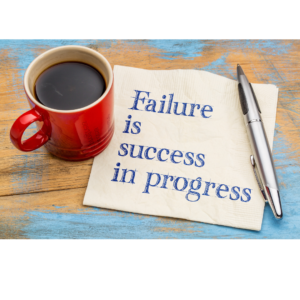Every day I have discussions with start-up founders, and occasionally I’ll encounter one that really makes me think. Recently, I had a chat that stuck a chord.
This founder was struggling to disassociate their self-worth from the successes and failures of their business. They were ensnared in a cycle of self-doubt, unable to detach from the highs of success and the lows of setbacks and ‘failures’. With each success, they rightfully celebrated, but with each setback, they descended into a spiral of doubt and embarrassment, and felt like a total failure as a founder and as a person.
Here’s the harsh truth they needed to accept: experiencing failure doesn’t make you a failure.
Failing is an inevitable part of the startup journey. Those who pretend it never happens are either lying or deluded. Savvy investors don’t see past failures as red flags – they’re almost a badge of honour if you’ve learned from them. From my own setbacks, let me explain the value and lessons to be learned in embracing failures:
Lessons Ingrained
Failure is a brutal teacher, exposing flaws you may never see when coasting on success. It highlights weaknesses, forcing you to improve. Those hard-learned lessons get ingrained, not just intellectually but psychologically.
Failure is a great teacher and if you are open to it, every mistake has a lesson to offer – Oprah Winfrey
Resilience and Grit
Failing and having the guts to go again anyway? That’s resilience. That’s grit. Crucial traits investors look for. Proves you can weather storms and persist through adversity.
We know from the media that most of the world’s leading entrepreneurs didn’t achieve their success without obstacles. Fred Smith, founder of FedEx was ridiculed by his college professor and told his business model wouldn’t work. Walt Disney was fired by a newspaper and told he had no imagination or good ideas. Bill Gates and friends came up with Traf-O-Data, a system that recorded traffic information and fed it back to government authorities, civil engineers and others – appeared that they weren’t too enthralled by it and the concept failed. Steve Jobs, Richard Branson, Arianna Huffington, even Thomas Edison experienced setbacks (2000 of them apparently)… but carried on anyway. This is not to say it was easy for them, I don’t imagine it was… but it taught them a valuable lesson in perseverance despite the odds stacked against you.
Innovate From Necessity
When you’ve fallen, you’re forced to think differently to bounce back. Sparks innovation and unique perspectives that can be a gamechanger. Success breeds complacency – failure cultivates an urgent need to adapt.
Don’t fear failure – plan for it. By accepting that setbacks are inevitable, you mentally prepare your team to use them as learning opportunities. Failures aren’t just hiccups, they’re catalysts showing where you went wrong and how to course-correct.
The mindset isn’t “expect every idea to fail.” It’s “be ready to fail, so you can iterate rapidly when you do.” Embrace failure as part of the innovation cycle from the outset. The sooner you depressurise failures, the sooner your team can take calculated risks and charge forward.
Hitting rock bottom forces you to innovate out of sheer necessity for survival. That raw hunger to adapt sparks strokes of genius you’d never uncover while resting on your laurels. Failures make you antsy, unsatisfied, determined to find a new angle – and that discomfort is where breakthroughs live.
Consider it Vetting
A failed business is almost a rite of passage for founders. Investors see you as more legit and experienced for having gone through the gauntlet already. Sure, success is great – but failures show you’ve really been battle-tested.
To leverage your failures and setbacks:-
- Reflect and Share: Embrace transparency by openly discussing past failures and focusing on the invaluable lessons gleaned.
- Champion Resilience: Showcase how overcoming failure has fortified your resilience, a trait revered by investors and teams alike.
- Innovate with Purpose: Leverage insights derived from failure to drive purposeful innovation, propelling your venture towards new horizons.
- Forge a Diverse Team: Embrace individuals who have weathered failure, recognising the wealth of experience they bring to the table.
- Communicate Authentically: Utilise your narrative to foster trust through authenticity, fostering deeper connections with stakeholders.
At the end of the day, I’d argue failure is one of the most valuable assets a founder can claim – if they’ve learned from it. Wear those battle scars with pride as badges of insight and resilience. That’s what investors, customers and future employees actually want to see.

